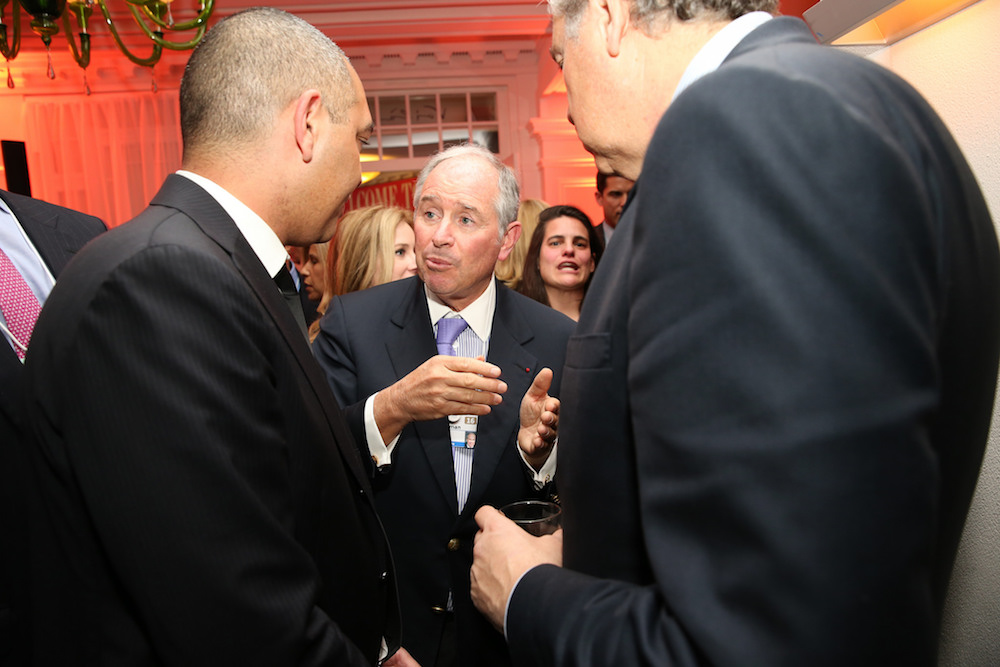This is a guest post by Rob Galbraith and originally appeared on Eyes on the Ties.
By now, many people have heard of Stephen Schwarzman.
Some may know him as the billionaire founder and CEO of the Blackstone Group, a mammoth private equity firm that has its tentacles spread across numerous subsidiaries and companies.
Others may know Schwarzman as a close ally and advisor of Donald Trump, the chair the president’s recently disbanded Strategic and Policy Forum, who is set to profit handsomely from his relationship with the president.
Some may even know Schwarzman as the thrower of lavish, self-glorifying birthday parties — his last one included fireworks, acrobats, live camels, celebrity performers, and a slew of high-profile guests, from David Koch to Jared Kushner, as well as several Trump cabinet members.
But fewer people know about Schwarzman the fracking profiteer, with billions invested in the fossil fuel industry that is fueling the climate crisis.
With this in mind, this installment of Eyes on the Ties “Frackateer of the Month” series shines a light on Schwarzman’s investments and influence within the oil and gas sector.
Finance, Fossil Fuels, and Trump
The oil and gas and high finance industries are deeply intertwined and dependent upon one another. Debt fuels the build-out of capital-intensive drilling projects and pipelines worldwide, while fossil fuels power global commerce, which Wall Street financiers make their living from betting on.
Through Blackstone Group, Schwarzman has bet billions of dollars on the oil and gas industry, buying interests in drilling fields, fracking companies, major pipeline projects, power plants and export facilities. Earlier this month the Wall Street Journal reported that Blackstone’s investment in the Energy Transfer Partners’ controversial Rover Pipeline brought its oil and gas investments up to $7 billion. The next week, Bloomberg reported that Blackstone had acquired Harvest Fund Advisors, an oil and gas investment firm with $10 billion in assets, for an undisclosed sum.
These wagers have occurred amid rhetoric from President Donald Trump promising to “unleash” the energy industry in the United States. As mentioned above, Schwarzman occupied a key Trump advisory role, leading a council of CEOs advising the president on economic issues until blowback from Trump’s sympathetic comments about white supremacists led Trump to dissolve the council.
Blackstone has already benefited from Trump’s energy policy. Trump reversed the Obama administration block of the Dakota Access Pipeline — which Blackstone has invested in — and has filled vacancies on the Federal Energy Regulatory Commission with appointees who are all but certain to continue the agency’s practice of rubber-stamping pipeline projects.
If Trump continues to make good on his pledge to expand fracking and pipeline infrastructure, Blackstone’s oil and gas bets could prove incredibly lucrative for Schwarzman, whose $425 million 2016 pay package mainly came in the form of stock dividends.
Blackstone’s Energy Bets
Blackstone’s billions of dollars worth of oil and gas investments span nearly every industry sector and include several extremely controversial pipelines being constructed by Energy Transfer Partners.
It was widely reported when Blackstone recently bought a 32.4 percent stake in ETP’s Rover Pipeline from West Virginia and Pennsylvania through Ohio to Michigan and Canada. Rover has been beset by problems throughout its construction: the pipeline has reportedly racked up more environmental violations than any other major pipeline in the past two years, leading to several government-ordered construction stoppages. Just before Blackstone bought into Rover, the Federal Energy Regulatory Commission stopped drilling on certain segments of the pipeline after ETP spilled 2 million gallons of drilling fluid, polluting wetlands in Ohio.
Blackstone also has a considerable stake in the Dakota Access Pipeline through its acquisition of Harvest Fund Advisors, a financial firm focused on investing in oil and gas infrastructure. According to regulatory filings, Harvest Fund owns 16.6 percent of outstanding shares of Energy Transfer Partners, which is a 38.25 percent owner of Dakota Access and 3.9 percent of outstanding shares of Energy Transfer Equity, ETP’s parent organization. Harvest Fund Advisors also owns 4.4 percent of outstanding shares of MPLX LP, a subsidiary of Marathon Petroleum that is a partial Dakota Access owner through a joint venture with Enbridge.
Dakota Access — which was halted by former President Barack Obama after months of public outcry over the threat the pipeline posed to the Standing Rock Sioux Reservation, only to be resumed once Donald Trump took office — went into service in June 2017.
Blackstone’s stake in ETP through Harvest Fund also means that it owns a stake in the controversial Bayou Bridge Pipeline planned along the southern coast of Louisiana. Bayou Bridge will bring crude oil from a hub Nederland, Texas (which is connected to Dakota Access by the Energy Transfer Crude Oil Pipeline) to refineries in St. James parish, Louisiana. The pipeline, which is co-owned by ETP and Phillips 66, has inspired protests similar to those against Dakota Access as well as a lawsuit on behalf of the communities that will bear the brunt of the pipeline’s negative impacts.
These pipeline interests, and other Blackstone oil and gas investments can be seen in the map embedded below:
Beyond pipelines, Blackstone is invested in the fracking operations that extract oil and gas from the ground. The firm entered into a joint partnership with Sanchez Resources to buy a $2.3 billion interest in drilling fields in the Eagle Ford Shale in Texas. In 2016, Blackstone invested $250 million in the Appalachian driller Huntley & Huntley. Earlier this spring, Vine Resources, a company formed by Blackstone to drill acreage it had purchased from Royal Dutch Shell, filed paperwork to make an initial public offering.
In the downstream sector, Blackstone is a major backer of Cheniere Energy’s Sabine Pass liquefied natural gas (LNG) export facility, in which it invested $2 billion in 2012 and which was approved to start exporting gas by the Obama administration. The firm also bought three natural gas power plants from American Electric Power for $2.17 billion in late 2016, in a deal that also included a coal plant.
Schwarzman’s ‘Trump Edge’ Could Bring a Big Payday
Though he did not endorse Trump or donate to his campaign, Stephen Schwarzman quickly insinuated himself into the president’s circle of advisors.
In December 2016, less than a month after the election and more than a month before Trump’s inauguration, Blackstone issued a press release announcing that Schwarzman had agreed to chair the “President’s Strategic and Policy Forum,” a council of business elites advising Trump on “his plan to bring back jobs and Make America Great Again.”
According to the New York Times, the forum was Schwarzman’s conception, and Schwarzman told Bloomberg that he personally chose all of its members for Trump to listen and learn from. Those members included former GE CEO Jack Welch, a vociferous climate change denier; Adebayo Ogunlesi, director of African offshore drilling company Kosmos energy and chairman and managing partner of Global Infrastructure Partners, a private equity fund set up by Credit Suisse and Goldman Sachs with many oil and gas investments; and Daniel Yergin, who operates an oil and gas industry consulting firm.
The council’s assignment — “cutting the government red tape that is holding back our businesses” — was a good fit for Schwarzman’s ethos; he once said that Obama administration taxes on private equity firms were “like when Hitler invaded Poland in 1939.”
The Strategic and Policy Forum only met a handful of times before it disbanded in August 2017 amid public furor over remarks Trump made sympathizing with the organizers of a violent white supremacist rally that left a counter-protester dead.
While the council was meeting, however, Schwarzman appears to have enjoyed wide access to and influence over the president. In April, Politico reported that Trump and Schwarzman talked “several times a week” and the New York Times reported after the council disbanded that “Schwarzman, of all council members, maintained the most consistent contact with the president.”
Trump’s policies have been a major boon for many of Blackstone’s businesses. In February, Trump canceled implementation of the fiduciary rule, which would have required firms like Blackstone to act in the best financial interest of their clients. That day, Trump boasted to Schwarzman that “we’re getting rid of your regulations.” During Trump’s May visit to Saudi Arabia, the Saudi sovereign wealth fund announced a joint plan with Blackstone to invest $40 billion in infrastructure projects, primarily in the United States.
Trump’s efforts to “unleash” the oil and gas industry in the United States have been especially beneficial for Blackstone, which, as described above, has dramatically ramped up its oil and gas investments.
Four days after taking office, Trump reversed former-President Obama’s December 4, 2016 decision to stop construction of Energy Transfer’s Dakota Access Pipeline, issuing a memorandum ordering the Army Corps of Engineers to “review and approve in an expedited manner” all “requests for approval to construct and operate the DAPL.” Though a judge ruled in June 2017 that Army Corps of Engineers February 2017 approval for the pipeline “failed to adequately consider the impacts of an oil spill on Standing Rock’s fishing and hunting rights and on environmental justice,” Dakota Access remains in operation, generating revenue for Blackstone and its other owners.
Trump has also restored the quorum on the Federal Energy Regulatory Commission (FERC), appointing two industry-friendly commissioners — former Mitch McConnell staffer Neil Chatterjee and former Pennsylvania Public Utility Commissioner Robert Powelson — to the agency in charge of approving pipeline projects. Under the chairmanship of Chatterjee, who led the Republican campaign to approve TransCanada’s Keystone XL pipeline, and with Powelson, who sat on a business council pushing for an expansion of oil and gas infrastructure in Philadelphia, FERC appears primed to resume its rate of approving nearly 100 percent of pipeline applications that come before it.
Other Trump actions that will benefit Blackstone’s oil and gas investments include permitting oil drilling in the Arctic Circle, ramping up the sale of oil and gas drilling leases on public lands, and pulling out of the Paris climate accord.
Though Trump’s proposed Muslim ban and his rejection of international action on climate change led several business leaders to quit the Schwarzman-helmed council, the Blackstone CEO stood by the president until the council dissolved in the wake of Trump’s response to the white supremacist violence in Charlottesville. Schwarzman later issued a statement condemning “bigotry, hatred and extremism,” though he supported the president’s comments blaming “many sides” for the violence at the right-wing rally the day afterwards. “I thought he was talking about the violence on both sides,” Schwarzman told Bloomberg at a party in the Hamptons. “I don’t think it was a far-reaching statement.”
While it remains to be seen if Schwarzman’s influence over Trump will outlast the disbandment of the Strategic and Policy Council, there has been no indication that Trump plans to abandon his agenda of deregulation and drilling bonanza. If this remains the case, then Schwarzman’s massive oil and gas bets are sure to bring him some big returns.
Main image: Stephen Schwarzman at a 2016 World Economic Forum event hosted by The Financial Times and CNBC. Credit: The Financial Times, CC BY 2.0
Subscribe to our newsletter
Stay up to date with DeSmog news and alerts







